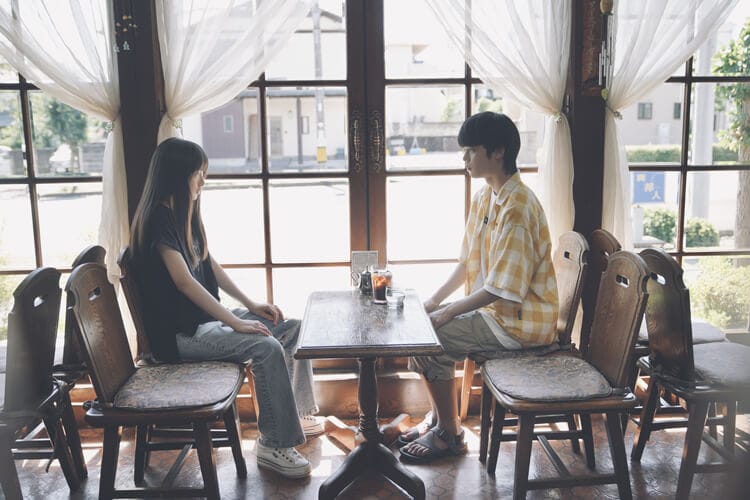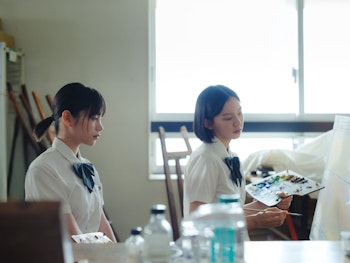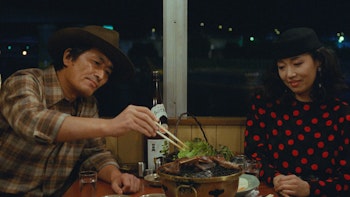
The impossibility of body swap lends it a comedic quality. Oh no, suddenly the guy has boobs, they cry. The girl has something down there that moves, they squeal. You don’t just switch bodies without reason. The universe doesn’t work like that, so it’s easy to make fun of it. Yet to laugh off its absurdity is also to laugh off a greater introspection about what it means to live as yourself, be perceived as yourself. If you can never fully understand someone’s life without walking in their shoes, how are you going to explain to someone that half of your life isn’t even your own? No one could ever get close to understanding your truth. It’s horrifying, really.
Can’t Cry With Your Face isn’t a horror, but its questions about living your truth and actualization through a realistic lens on this absurd topic force the audience into an existential self-reflection on identity and selfhood that turns a grounded drama into a mirror on the soul. Because no matter how much you try and succeed or fail at achieving a dream and a hope, at the end of it all, it’s still you in the mirror, right? Whether filled with regrets or hope, it’s you in the reflection at the end of it all.
But what if it wasn’t?
It started in the first year of high-school, aged 15. Riku pranks Manami by pushing her into the pool, and as they both plunge under the water, they swap bodies. They try to reverse it, but fifteen years later at the age of 30, they’ve not returned to their old body even once. They’ve graduated school and university and lived half their lives in the wrong body. When the now-Riku (formerly Manami played by Kaito Takahashi, and Nao Takeuchi in their school days) reveals to the now-Manami (formerly Riku and played by Kyoko Yoshine as an adult and Airi Nishikawa as a highschooler) that they may have found a way to return back to their old bodies and lives.
Over the years, both experience significant life milestones while living as each other. With half their lives in each other's body and a new life established, should they or do they want to return back, after all this time? Would it be selfish to change, or even more selfish to remain, knowing this possibility existed?
Magical realist drama can use the unreal to conceptualize the indescribable, and the doubt over who you are and could become is a shared experience felt by many that nonetheless is difficult to put into words. The film, for its credit, makes this accessible by easing us into the scale and gravity of these changes via flashbacks, while holding off the more intense implications of what it means to live as another until later in the film.

In the opening scene, Cafe Stranger, the home for the pair’s yearly meetings to recap how their lives in each other’s bodies are progressing, welcomes these two to their usual table. As an audience, without awareness of the synopsis the film doesn’t expect you to understand what has happened to them. It’s only in subtle moments they bring up to each other that you get clued to the switch that once occurred, so used to this switch and incognito to the world. Like a return home to the only person who understands, the mannerisms they built slip - a masculine pronoun here, a funny laugh as now-Riku discusses their many girlfriends.
Ostensibly, the film explores this conversation and the pondering for a few hours about whether to try this new attempt to switch back into their old bodies before the end of the day, the limit for this new plan. This is contextualized by flashbacks which begin the day of their switch and reflect on how things have evolved over time. They really try, they hope for a return, then they merely agree to switch notebooks detailing their lives while attempting to understand if they can ever go back. It’s not sensationalized, there’s merely a fear and dread over the situation.

And I mean, why wouldn’t it be scary? You’re a teenager at a stressful time deciding your future, and suddenly you have memories of a childhood that don’t match your body. Now-Manami tries to see their parents under the guise of being Riku’s friend, and they’re told they’re rude and not to return, cutting off any reconciliation with them. What about the other expectations of maintaining friendships, relationships? Could you, switched bodies, start a relationship? Would you feel betrayed if your other started one, or lost your virginity for you?
It’s this complex mental trauma and confusion that sucks you into this unique life the two have stumbled into. Their lives aren’t more sensational for being switched, but does that not make it even more weird? Getting used to this new body, getting married, having a kid. The expectations preventing a true explosion of grief or joy if that betrays the expectations of this new life. Accepting a fate you never expected, but still not feeling like your body is your own. Or, perhaps, feeling it is, but having this fear that, if you died, no one would know the real person who lost their life.
It’s all shot in such an empathetic manner, with both warmth and distance that reflects the weird state of life, yet it’s ultimately the script that shines. It’s a stunning exploration of identity elevated by leaving nothing unexplored in its 100-minute runtime. While I doubt it was entirely intentional, a life like this, especially as the pair bitterly argue over whether to try this potentially-final chance to return to their old lives, feels like an exploration of not just youthful anxiety but queer and trans identity.

These are friends, not romantic partners, trying to understand what life is in a body that isn’t theirs. Can’t Cry With Your Face recalls a Heian period tale known as The Changelings, self-published about two people who swapped bodies where the man claimed to be a woman and vice versa. Living a life where your mind didn’t match your body, the two earnestly are forced to face this head-on and decide if they want to accept this life or work to live authentically as their true self. Now-Manami struggles for years with even the concept of entering a heterosexual relationship, feeling that they couldn’t with these strong feelings of their old body, and the question of whether to stay as they are is a question of which gender is more authentic.
Whether intentional or not, it was welcome to note the team consulted LGBTQ organizations in production regardless.
Life is fluid and confusing, just as the bonds we form are fluid. Sometimes your journey changes before its destination, and it’s a question of going down the path that feels most right. The cleverness and subtlety in how it leaves the audience open to finding their own answers alongside and independent of the characters, turning this unrealistic body-swap scenario into a very-real reflection on identity, is where the story shines. Few films can turn you inside out and expose your deepest thoughts in such a short amount of time, yet Can’t Cry With Your Face does so without dictating the answer. Whether you act or leave it to fate, that’s your decision.










